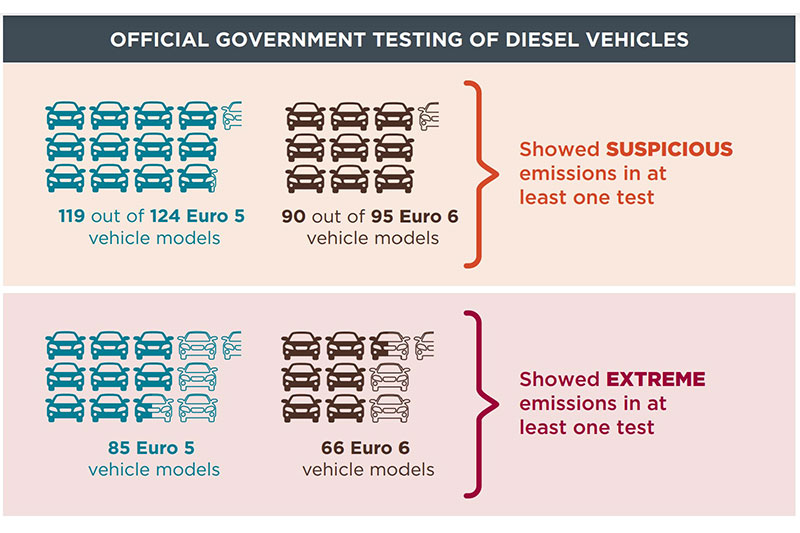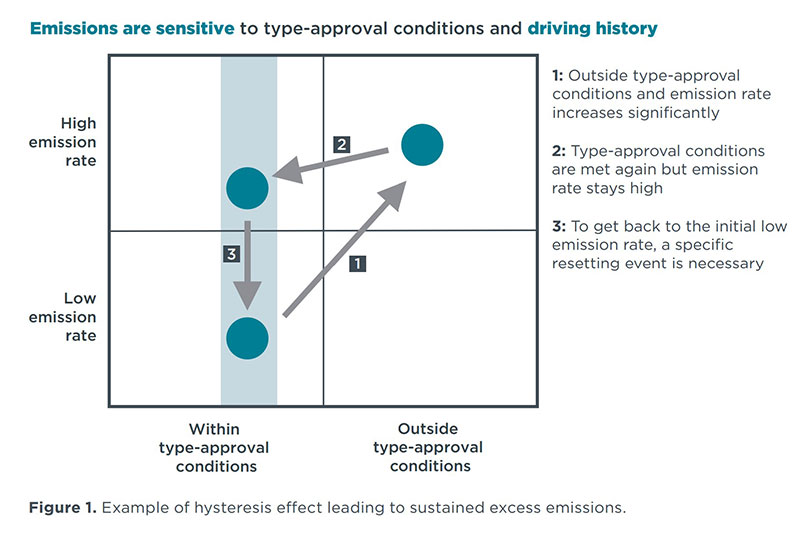True data supports revelation that 13 million vehicles on Europe’s roads are likely deploying cheat emissions device

Up to three-quarters of European diesel vehicles are producing “extreme” NOx emissions which indicate they have cheat devices installed, warns new analysis from the International Council on Clean Transportation (ICCT) which drew on TRUE Initiative data.
These devices - which may now be classified as ‘prohibited’ after recent rulings of the Court of Justice of the European Union (CJEU) - must be investigated by Member States, including the UK as retained EU law.
A new study, carried out by TRUE Initiative partner the ICCT, assessed the magnitude of “suspicious” and “extreme” emission levels shown in post-Dieselgate testing performed by government and independent organizations since 2016. The emission levels are defined based on expected emission behaviour for given types of tests. The findings were featured in an exclusive story for UK Channel 4 News.

According to the investigation, not only did a large majority of tests (85% for Euro 5 and 77% for Euro 6 diesel cars) show “suspicious” excess emissions, but at least 40% showed “extreme” emission levels, indicating the “almost certain” presence of a calibration strategy that may* now be considered a prohibited defeat device.
The ICCT also assessed data collected through past remote sensing campaigns, which measure the real-world emissions of vehicles from the roadside as drivers pass. The data, consisting of 700,000 measurements in five European countries - including TRUE data from London and Paris - showed that approximately 75% of diesel car engine families’ emission averages were found to exceed the “extreme” threshold.
The ICCT report also analyzed the statements presented by manufacturers during investigations conducted by national market surveillance in four European countries. From these statements, the ICCT identified 66 vehicle models that used calibration strategies that are now considered prohibited defeat devices based on the latest CJEU rulings because they function during normal driving conditions. Most of these vehicle models (48) use emission calibration strategies that alter or deactivate the emissions control system in low ambient temperatures which are typical within the EU.
Approximately 53 million diesel cars were sold in Europe from 2009 to 2019, emitting high levels of NOx, a hazardous air pollutant that poses a significant risk to human health. A companion analysis by the ICCT estimates that 19 million vehicles with “suspicious” emissions remain in use today – of these, 13 million vehicles were models showing “extreme” emissions. The issue of excess NOx emissions is prevalent across manufacturers. These vehicles, however, continue to operate across Europe today, harming the health of all who are exposed to the air pollution these emissions create. Other ICCT estimates suggest more than 35,000 people die in Europe each year as a result of these excess emissions.

“It is difficult to dispute what is a large amount of analysed data and testing collected from multiple sources. All of them point in the same direction. After the CJEU rulings, these results present a solid body of evidence for authorities to investigate and potentially take corrective action to address health risks posed by European diesel cars driven on our roads”, says Peter Mock, ICCT’s Europe Managing Director.
ICCT first uncovered the Dieselgate scandal, the widespread use of defeat devices or calibration strategies intended to disable or reduce the efficiency of emission control systems in diesel vehicles more than seven years ago. A defeat device is a software code installed in the vehicle to alter or deactivate the emissions control system under certain operating conditions. Substantial evidence has shown that diesel cars across manufacturers emit high levels of nitrogen oxides (NOx) during real-world operation.
Since the Dieselgate scandal, only some manufacturers have performed recalls and updates of diesel cars in Europe. The impact of these updates is unclear as many vehicles have not been retested, or the testing results have not been released publicly.
“The levels of emissions found in the tests offer wide-ranging data to estimate the prevalence of prohibited defeat devices. What we found is that vehicles surpassing the “extreme” threshold is a red flag and should pose questions about the rationale for their emission behaviour. A total of 150 vehicle models show emissions above it and represent about 13 million vehicles still on the road in the EU-27 and UK,” stated Yoann Bernard, Senior Researcher at the ICCT.
Air pollution continues to be the biggest environmental health hazard in Europe. Diesel vehicles are a major contributor, largely due to high NOx emissions.
Sheila Watson, FIA Foundation Deputy Director, said: “This is an important study with a truly shocking set of conclusions. It suggests that excess emissions are not restricted to a small number of manufacturers but are an accepted industry practice, even though the toxic results of this deliberate fakery costs thousands of lives every year. This research further proves the importance of real-world emissions testing to produce independent, reliable data upon which impactful legislation can be based.”
* Note - European courts continue to review evidence from related cases. In a ruling released in December 2020, the CJEU clarified the conditions under which defeat devices are prohibited, even for vehicles sold prior to the decision. It stated that “only immediate risks of damage which create a specific hazard when the vehicle is driven… justify the use of a defeat device” (C-693/18). The judges broadly limited the scope of exemptions. Additional CJEU rulings in July 2022 further clarified that defeat devices cannot be justified in any event if they operate throughout most of the year during normal driving conditions.



